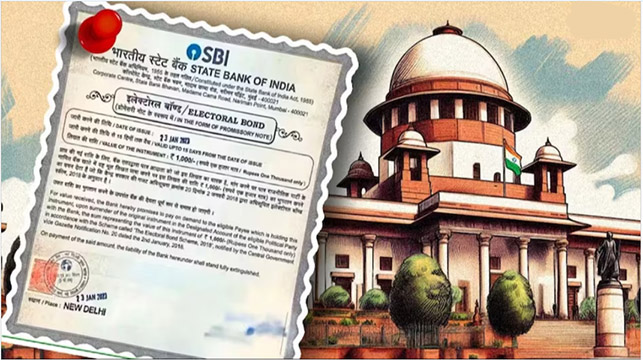Justice is delayed, but not denied. We may say it in respect of the Electoral Bond Scheme of the Central Government, launched in 2018. Those who are opposed to it may be overjoyed with the recent pronouncement of five Judge Constitutional Bench of Supreme Court. The genesis of the Electoral Bond lies at the Budget Speech of the then Finance Minister, Shri Arun Jaitley, when he presented the Union Budget to the Parliament for fiscal 2017-18. Ironically, Arun Jaitley, a senior learned lawyer by profession, promised transparency in funding of political parties by individuals, corporates, etc. In fact, he did not propose to do away way with the current mode of contribution to political parties-cash, cheque, demand draft, electronic fund transfer. Rather, he added a new scheme to enable individuals, corporates to anonymously transfer contributions to political parties registered with Election Commission of India and which secured at least 1% of the votes in the elections to Lok Sabha or State Assemblies.
What could be the motive behind the launch of Electoral Bond by the Central Government despite strong opposition from Reserve Bank of India and Election Commission of India? At the heart of the scheme is protection or non-disclosure of the identity of the donor so that it can freely contribute to the political parties expecting business as rewrd. In other words, it will not be far to arrive at the conclusion that there were many willing donors to contribute liberally to political parties provided that their identity is kept secret and there is promise of quid pro quo. Being in power and to be the major beneficiary of the proposed scheme, the Central Government overlooked all the objections to the proposed Electoral Bond Scheme.
Why was the Scheme of Electoral bond declared to be unconstitutional? Any policy or programme of the Government which is not in line with the provisions of the Constitution of India is said to be unconstitutional. In several judgments rendered by the Supreme Court of India, the meaning of rights guaranteed by Part III of the Constitution, i.e, fundamental rights has been interpreted to include many rights which are not obvious to the general public. For instance, in the judgment of the Appeal (civil) 7178 of 2001 filed by Union of India against Association of Democratic Reforms, it was held that voter has a fundamental right to know the candidate before she exercises her franchise. Criminal antecedents, assets and liabilities, educational qualification, etc. are now required to declared in an affidavit by the candidate. This has been incorporated in the Election Conduct Rules.
Political parties are important players in the democratic process in our country, which is committed to the purity of democracy. Their functioning and financing have been recognised as important for a vibrant democracy, and hence the government allow tax exemptions for both donor and political parties. While corporate financing of political parties and individual is accepted across the globe, transparency in terms of disclosure of name of donors and donations by the companies in their financial statements under the Companies Act, 1956(now 2013), Income Tax Act and Representation of the People Act, 1951 has been complied in respect of donation by cash or cheques under the policy before Electoral Bond. However, contrary to the announcement by Shri Arun Jaitley, Finance Minister in the Budget Speech promising transparency in contribution to political parties, new Electoral Bond Scheme, which came into operation in 2018 did away with disclosure of the name of donors and donees under Electoral Bond Scheme by making amendments in Income Tax Act, Representation of the People Act and Companies Act for contributions made under Electoral Bond Scheme. The scheme became the most opaque way for political finding in free India.
Five Judge Constitution Bench of Supreme Court of India in a batch of petitions filed by Association of Democratic Reforms and others in a unanimous judgment pronounced on the 15th February, 2024 held the Electoral Bond Scheme unconstitutional as the right to information of voters guaranteed by Article 19(1)(a) of the Constitution is violated by the non-transparency of the Electoral Bond. Further, the amendments made by the Finance Act, 2017 in Income Tax Act, Representation of People Act, the Companies Act and Reserve Bank of India Act were also struck down for being arbitrary and illegal. Authorized and Designated bank, SBI was asked to share details of donors and donees since the 12th April, 2019, when the Supreme Court passed an interim order in the same writ petitions with Election Commission of India, which in turn shall upload the details on their website for access by the public. The Scheme of Electoral Bond Scheme has been done away with from the 15th February, 2024. State Bank of India after dragging its feet and most reluctantly has furnished the information to ECI on the 13th March, 2024.
The judgement of Supreme Court, which came after many years since it was filed in 2017, though delayed, will remain a landmark judgment contributing towards improvement in electoral politics in India, and reducing the scope of quid pro quo built in the political funding by corporates. Efforts by civil society organizations and individuals to check arbitrary and unconstitutional acts by the state is worth appreciation. The unanimous and unambiguous pronouncement by the Constitution Bench of Supreme Court will remain to be historic and remarkable in that excesses of State gets checked by the judiciary in terms of Constitution of India, which is sacrosanct.










